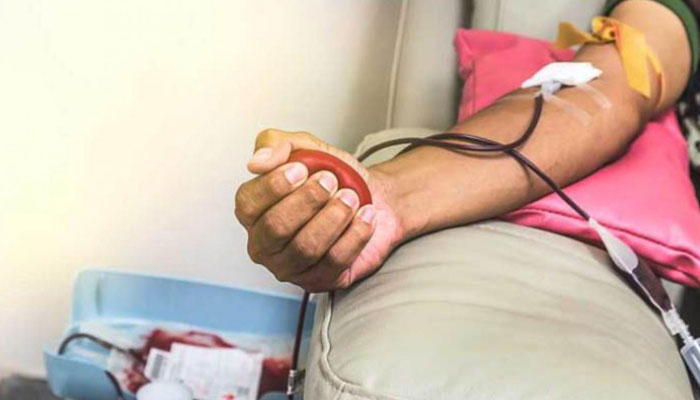Donating blood
Blood donation serves as lifeline for countless individuals facing medical emergencies, battling life-threatening illnesses
In a country as populous as Pakistan, the importance of blood donations cannot be overstated. Yet, despite a population exceeding 240 million, voluntary blood donations make up only a fraction of the supply needed to meet medical emergencies and ongoing healthcare demands. This stark reality underscores a critical need for concerted efforts to promote and facilitate voluntary blood donations across the nation. Sindh Chief Minister Syed Murad Ali Shah's recent commitment to advancing this cause through the launch of Indus Zindagi is a commendable step in the right direction. The chief minister has rightly pointed out that the scarcity of readily available blood has resulted in unnecessary loss of lives. Indus Zindagi, spearheaded by the Indus Hospital & Health Network (IHNN), aims not just to raise awareness but to inspire action. As the Sindh government pledges its full support to Indus Zindagi, it sets a precedent for other provinces to follow suit. The success of this initiative hinges not just on governmental backing but on grassroots mobilization and public participation.
Despite its critical role in saving lives, blood donation often remains overlooked or underestimated in public consciousness. Blood donation serves as a lifeline for countless individuals facing medical emergencies, undergoing surgeries, battling life-threatening illnesses, or recovering from accidents. Each donation can potentially save up to three lives, underscoring its unparalleled humanitarian impact. The availability of safe and adequate blood supply is crucial not only in routine medical care but also in responding swiftly to disasters and emergencies. Across the globe, and particularly in countries like Pakistan, where healthcare resources can be strained, voluntary blood donations play a pivotal role in bridging gaps and ensuring timely access to blood for those in need. The benefits of donating blood extend beyond immediate medical emergencies. Regular blood donation has health benefits for donors as well, including reducing the risk of cardiovascular diseases and certain cancers. It also promotes the production of new blood cells, thereby improving overall health and well-being.
Modern blood donation processes are safe, quick, and relatively painless. Donors are screened for eligibility, ensuring both the safety of recipients and the well-being of donors. Moreover, the act of donating blood fosters a profound sense of community and solidarity. It brings together people from all walks of life, united by a common purpose: to give the gift of life. In times of crisis, such as natural disasters or pandemics, the resilience of blood donors and blood donation organizations becomes even more evident, as they step up to meet increased demands and alleviate suffering. The message the state needs to give through awareness campaigns is that blood donation is not just an act of charity but an act of profound humanity.
-
 Lewis Capaldi Sends Taylor Swift Sweet Message After 'Opalite' Video Role
Lewis Capaldi Sends Taylor Swift Sweet Message After 'Opalite' Video Role -
 Sarah Ferguson Joins Andrew In ‘forcing’ Their Daughters Hand: ‘She Can Lose Everything’
Sarah Ferguson Joins Andrew In ‘forcing’ Their Daughters Hand: ‘She Can Lose Everything’ -
 'Bridgerton' Author Reveals If Actors Will Be Recast In Future Seasons
'Bridgerton' Author Reveals If Actors Will Be Recast In Future Seasons -
 50 Cent Super Bowl Ad Goes Viral
50 Cent Super Bowl Ad Goes Viral -
 'The Housemaid' Lifts Company's Profits: Here's How
'The Housemaid' Lifts Company's Profits: Here's How -
 Michael Douglas Recalls Director's Harsh Words Over 'Wall Street' Performance
Michael Douglas Recalls Director's Harsh Words Over 'Wall Street' Performance -
 Henry Czerny On Steve Martin Created Humor On 'Pink Panther' Set
Henry Czerny On Steve Martin Created Humor On 'Pink Panther' Set -
 Lady Victoria Hervey: Andrew Mountbatten-Windsor's Ex-girlfriend Proud Of Being On Epstein Files
Lady Victoria Hervey: Andrew Mountbatten-Windsor's Ex-girlfriend Proud Of Being On Epstein Files -
 Huawei Could Revive Chip Technology If US Lets Guard Down, Intel CEO Says
Huawei Could Revive Chip Technology If US Lets Guard Down, Intel CEO Says -
 Dolly Parton Created One Of Her Iconic Tracks With Acrylic Nails?
Dolly Parton Created One Of Her Iconic Tracks With Acrylic Nails? -
 Parents Alarmed As Teens Form Emotional Bonds With AI Companion Chatbots
Parents Alarmed As Teens Form Emotional Bonds With AI Companion Chatbots -
 Denzel Washington Surprises LeBron James
Denzel Washington Surprises LeBron James -
 Cillian Murphy's Hit Romantic Drama Exits Prime Video: Here's Why
Cillian Murphy's Hit Romantic Drama Exits Prime Video: Here's Why -
 Paris Hilton Reveals What Keeps Her Going In Crazy Schedule
Paris Hilton Reveals What Keeps Her Going In Crazy Schedule -
 Deep Freeze Returning To Northeastern United States This Weekend: 'Dangerous Conditions'
Deep Freeze Returning To Northeastern United States This Weekend: 'Dangerous Conditions' -
 Inside Dylan Efron's First 'awful' Date With Girlfriend Courtney King
Inside Dylan Efron's First 'awful' Date With Girlfriend Courtney King




